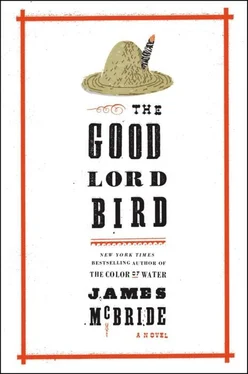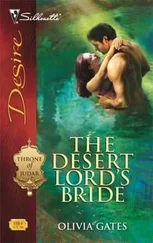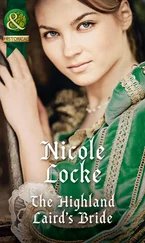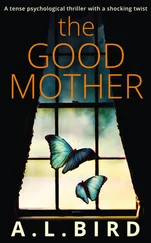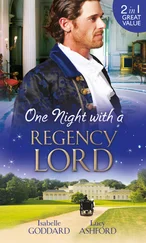As we crossed the bridge, I had a clear sight of the armory from above. By God, there was three hundred militiamen down there if there was one, milling around the gate and walls and more coming from town and Bolivar Heights above it, cramming at the entrance, lining the riverbank, all along the sides of the armory walls. All white men. Not a single colored in sight. The armory walls was surrounded. We was riding into death.
I got light-headed on God then. The devil flew off my back and the Lord latched Hisself to my heart. I said, “Jesus! The blood.” I said them words and felt His spirit pass through me. My heart felt like it busted out the penitentiary, my soul swelled up, and everything ’bout me, the trees, the bridge, the town, became clear. I then and there decided if I ever cleared things, I would tell the Old Man what I’d felt, clear it with him ’bout all that religious blabbing he’d done, that it weren’t for naught, and also clear it with him ’bout not saying nothing ’bout the Rail Man and a few other assorted lies I told. I didn’t think I’d have the chance, to be honest, which I reckon means I weren’t totally given to the spirit. But I thunk on the notion anyway.
As we cleared the bridge and the wagon turned toward the armory, I turned to O.P., who was hanging on the running board by his fingernails. I said, “Good-bye, O.P.”
“Good-bye,” he said, and he done something that just knocked me out. He dropped off that wagon to his death and rolled down the bank into the Potomac. Rolled like a potato into the water, and that was the last I seen of him. Must’a been a good twenty feet. Rolled into the water. He weren’t going back to the armory to get shot up. He chose his own death. Chalk up a second colored to the Old Man’s scheme. To count, I’d seen with my own eyes the first two folks deadened in the Old Man’s army on account of him freeing the colored was the colored themselves.
We come to the armory gate with the Coachman hollering all the way that we had Colonel Washington, rolled right through that mob, and busted into the yard clear. The mob weren’t going to stop us. The colonel was in the wagon. They knowed his coach and knowed who he was. I reckoned they parted on account of an important man being inside there, but when we come through the gate and hit the yard clean, I seen the real reason why.
That yard was dead as a cornfield. Quiet as a mouse pissing on cotton.
What I couldn’t see from the bridge, I seen from the ground in front of the engine house. The Old Man had been busy. There was several dead men laying out in the open, white men and a couple of colored, too, all within shooting range of the engine house and buildings around it. The Old Man weren’t fooling. That’s why them militia congregated outside the armory gate and walls. They was still scared to go inside. He’d been beating ’em off.
The Coachman wheeled that wagon around a couple of chewed-up dead fellers and finally got tired of steering around them and just aimed the wagon straight for the engine house, bouncing over the heads of a couple of the dead—it didn’t bother them nohow, they didn’t feel nothing. He stopped dead directly in front of the engine house, those inside flung the door open, and we rushed inside, the door closing behind us.
That place stunk something ferocious. There was thirty or so hostages in there. Whites was gathered on one side of the room and the colored on another side, separated by a wall, but it weren’t a continuous wall to the ceiling, so you could move between the two sides. Nar privy was on either side of the room, and if you thunk whites and coloreds was different, you ain’t got a big put up to the truth when you get a whiff of their nature doings and comes to the understanding that one pea don’t grow to no higher grade than the other. That place reminded me of them Kansas taverns, but worse. It was downright infernal.
The Captain stood by a window, holding a rifle and his seven-shooter, looking calm as a corn shoot, but a little beaten down, truth be to tell it. His face, old and wrinkled even in normal times, was covered in grit and powder. His white beard looked like it’d been dipped in a bag of dirt, and his jacket was flecked with holes and gunpowder burns. He’d been up thirty hours without sleep and no food. Still, compared to the rest of his men, he looked fit as a fiddle. The others, young men, Oliver, Watson—who had been flushed off the Shenandoah—Taylor, looked clean run out, their faces white, pale as ghosts. They knowed what they was looking at. Only the Emperor seemed calm. That was a bodacious Negro there. And other than O.P., a braver man I never saw.
Stevens handed the Old Man Colonel Washington’s sword, which the Captain held high. “That is righteous,” he said. He turned to Colonel Washington’s slaves who had just come off the wagon and entered the Engine Works and said, “In the name of the Provisional Government of the United States, I, President John Brown emeritus elected, E pluribus unum , with all rights and privileges hereto, selected by a Congress of your brethren, I hereby pronounces you is all free . Go in peace, my brother Negroes!”
Them Negroes looked downright befuddled, of course. Weren’t but eight of ’em. Plus a few more lined up against the wall as hostages already, and they weren’t going nowhere, so that added to their confusion. Them Negroes didn’t move nor spout a blaming word between ’em.
Since nobody said nothing, the Old Man added, “Course if you want, since we is all here fighting a war against slavery. If you wants to join us in battling for your freedom, why, we is all for that, too. And for that cause, and for the cause of your freedom in the days ahead, so that no one can wrest it from you, we is going to arm you.”
“We done that,” Stevens said. “But their pikes fell off in the ride down.”
“Oh. Well, we got more. Where’s O.P. and the others?”
“I don’t know,” Stevens said. “I thought they was on the wagon. I reckon they’re hiving more bees.”
The Old Man nodded. “Yes, of course!” he said, looking at the flock we just brought in. He went down the line of Negroes, shaking a hand or two, welcoming them. The Negroes looked glum, which he ignored course, talking to Stevens as he shook their hands. “This is working exactly the way I figured it, Stevens. Prayer works, Stevens. Spiritualist that you is, you really ought to become a believer. Remind me to share with you a few words from our Maker when there is time, for I knows you have it in you yet to turn to the ways of our Great Humbler.”
He had plain gone off the deep end, of course. O.P. weren’t hiving nothing but the bottom of the Potomac. Cook, Tidd, Merriam, and Owen, they’d taken the tall timber back at the Kennedy farm. They was gone, I was sure. I never held that against them, by the way. They valued their skin. There was weak spots in them men, and I knowed all ’bout that, for I had weak spots myself—all over. I weren’t against ’em.
The Old Man suddenly noticed me standing there and said, “Stevens, why is Onion here?”
“She come back to the Ferry on her own,” Stevens said.
The Old Man didn’t like it. “She ought not be here,” he said. “The fighting’s gotten a bit dirty. She ought to be hiving more bees in safety.”
“She wanted to come,” Stevens said.
That was a damn lie. I hadn’t said a thing ’bout going back to the Ferry. Stevens gived orders at the schoolhouse, and like usual, I done what he said.
The Old Man placed his hand on my shoulder and said, “It does my heart good to see you here, Onion, for we needs children to witness the liberation of your people and to tell stories of it to future generations of Negroes and whites alike. This day will be remembered. Besides, you is always a good omen. I have never lost a battle when you is about.”
Читать дальше
